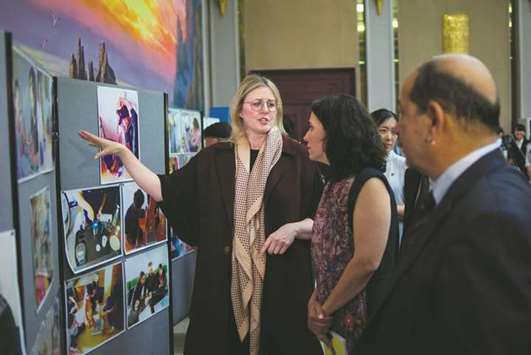New data from North Korea show a “slight” improvement in children’s health, the United Nations reported yesterday, saying the isolated nation had made a step forward by providing better information about the condition of its people. The findings published by the UN children’s agency Unicef were based on surveys of more than 8,500 North Korean households conducted by the government’s Central Bureau of Statistics.
While North Korean children continue to confront major health challenges, the data show that the national stunting rate, a key indicator of malnutrition among children, dropped from 32.4% in 2009 – the last time the surveys were conducted – to 19% last year.
But the figures on stunting varied significantly across the country. In the capital Pyongyang, 10% of children were affected by stunting, while in the rural Ryanggang province the rate was 32%. Pyongyang’s co-operation with Unicef in collecting and releasing the data has also improved substantially since 2009, the agency’s east Asia and Pacific director Karin Hulshof told reporters in Geneva.
“This new seriousness and improved openness about data is in Unicef’s view a real step forward,” she said.
Hulshof declined to tie North Korea’s increased co-operation to changes that followed the death of leader Kim Jong-il’s in December 2011. His son and successor Kim Jong-un has made a series of outreaches to the international community, including an historic nuclear summit US President Donald Trump this month. But Unicef said the improved co-operation on children’s health pre-dated the latest diplomatic developments. “I would just like to remind everyone that these data were collected in 2017, so that is sometime before the latest summits,” Hulshof said, noting the agreement to carry out the fresh surveys was reached between Unicef and Pyongyang in 2016. The data also indicated that a full third of North Korea’s drinking water is contaminated, posing another major threat to healthy growth among children. Unicef said those water problems were likely linked to poor systems for managing human waste. And, while the stunting figures indicate nutrition has improved for some, “only one in three children age six to 23 months receive the minimum acceptable diet,” Hulshof said. A separate UN-led report last year found chronic food shortages in North Korea, with around 41% of the population – or some 10.5mn people – undernourished. The UN official credited increased humanitarian aid for the gains made and voiced hope that better data would allow international agencies to more effectively target their assistance in the country.
Hulshof said Unicef would now move on to “a detailed analysis of the data to put the numbers in context.” But, she added, “the data is already providing us with a lot of food for thought.” Unicef said the methodology it used in North Korea was the same used in the 107 other countries where the surveys, known as the Multiple Indicator Cluster Survey (MICS), have been carried out. Still, the actual questionnaires in private homes were filled out by workers from the totalitarian state.

Deputy executive director for the United Nations Children’s Fund (Unicef), Shanelle Marie Hall (left), looks at pictures displayed at the launch of findings from the agency’s u201cMultiple Indicator Cluster Surveysu201d (MICS) on North Korea, at the Taedonggang Diplomatic Club in Pyongyang.
